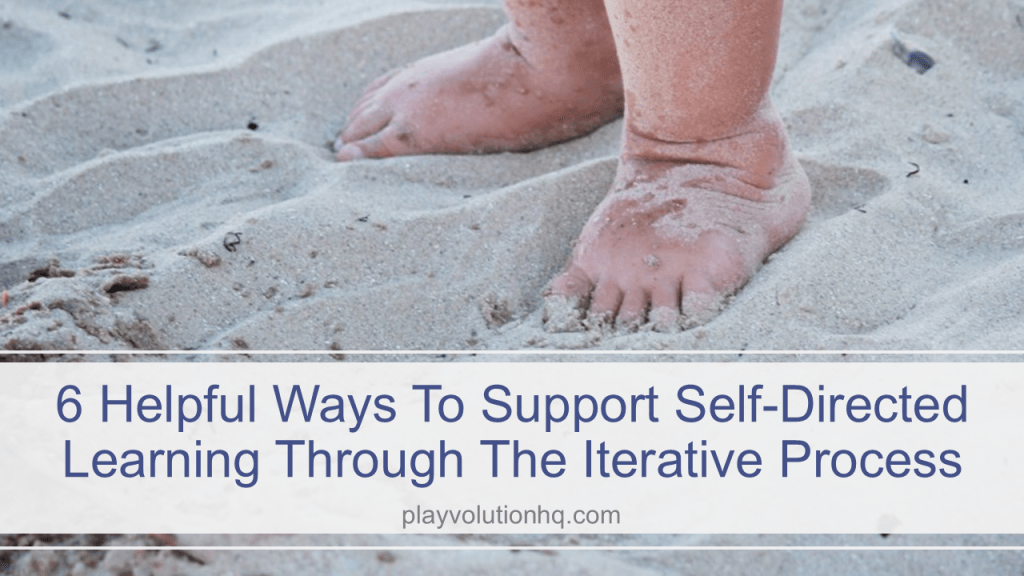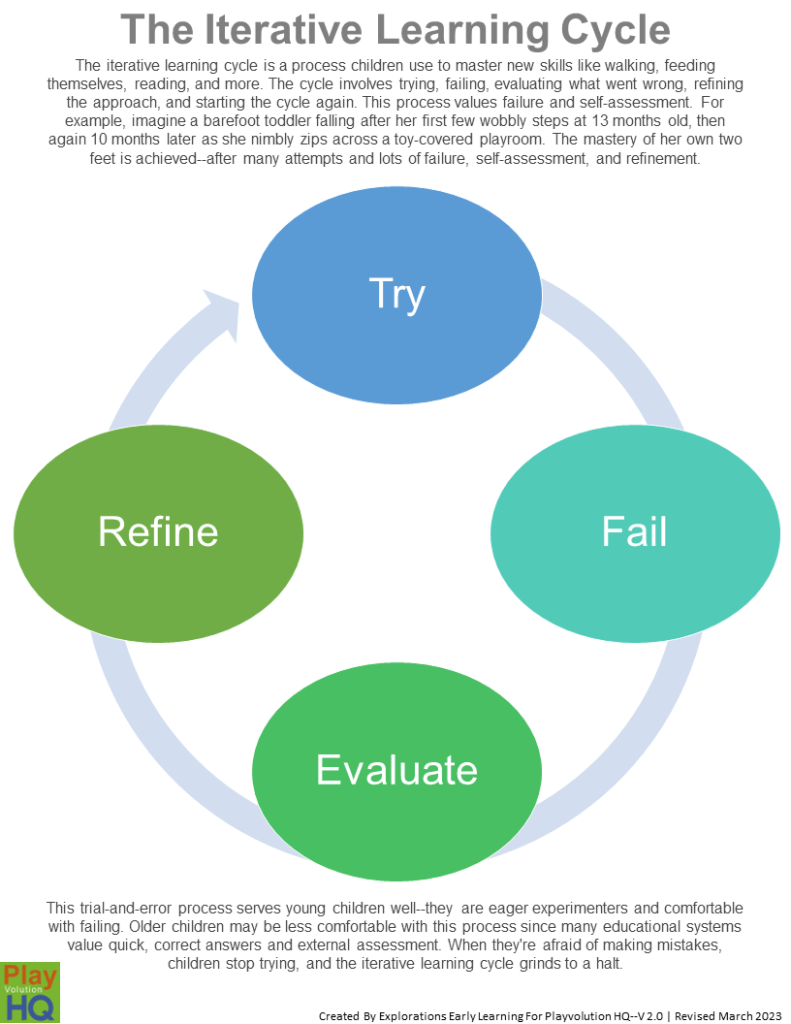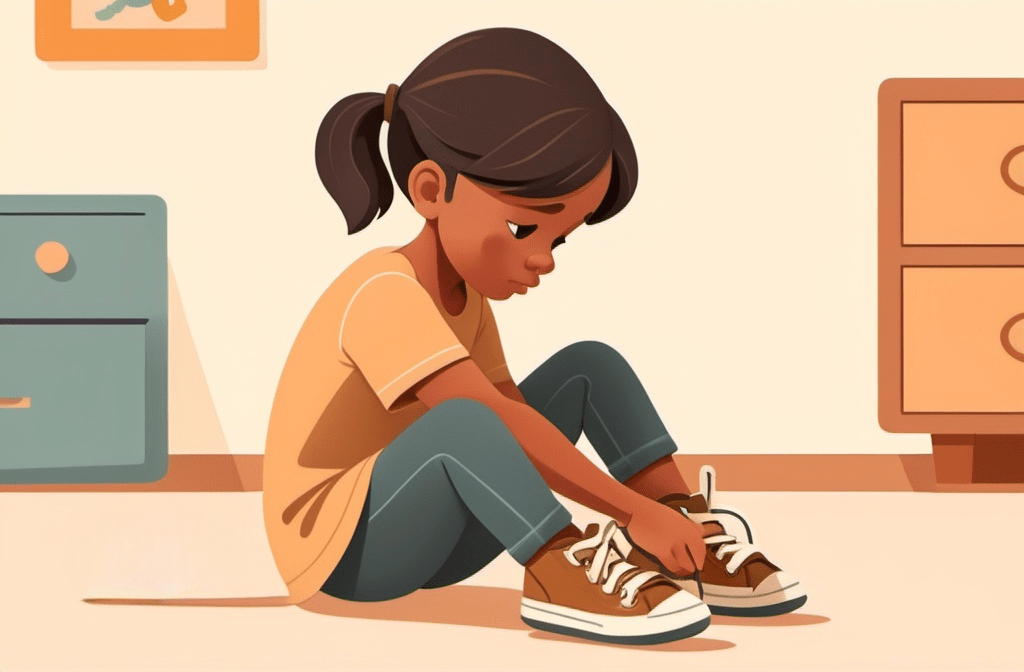
Table of Contents
Learning through the iterative process—try, fail, evaluate, refine—is a cornerstone of self-directed learning. This natural cycle of experimentation helps children build resilience, problem-solving skills, and independence. However, fostering this process requires intentional support from caregivers and educators. This post explores why the iterative process is vital and offers six practical ways to help children use it.
What Is The Iterative Learning Cycle?
The cycle involves:
- Trying–Making an initial attempt
- Failing–Facing setbacks or mistakes
- Evaluating–Assessing what went wrong
- Refining–Adjusting the approach to try again
For example, a barefoot toddler learning to walk may fall repeatedly as they master their balance. Over time, through trial and error, they refine their movements until walking becomes second nature. This same cycle applies to everything from tying shoes to mastering math problems.
Children supported in learning through the iterative process grow into confident, capable problem-solvers who aren’t afraid to take on new challenges. Here’s a handy free handout I put together explaining the cycle:

Some Examples
Here are three examples of kids using the iterative process:
- Learning To Tie Shoes–Samantha, age 5, loops her laces, but they slip apart before she finishes the bow. After evaluating her grip and tightening the laces, she tries again until she masters the skill by her fifth attempt.
- Mastering The Monkey Bars–Jackson, age 6, builds his grip strength and adjusts his leg swing technique after falling off the monkey bars several times. His persistence pays off when, after weeks of practice, he makes it all the way across.
- Creating The Tallest Block Tower–Elena, age 4, experiments with different stacking methods after noticing her block towers keep collapsing. After experimentation, she starts with a wider base and carefully balances the blocks, completing the tallest tower she’s ever built.

6 Helpful Ways To Create Environments That Foster Iterative Learning
Embrace Failure
Allow children to make mistakes without fear of judgment. Celebrate their effort and curiosity rather than just their results.
- Example: When Samantha struggles to tie her shoes, her caregiver says, “You’re working hard at this. Keep trying—it’s okay to mess up while you figure it out!”
Provide Open-Ended Materials
Offer resources that encourage exploration without a predefined outcome, like building blocks, art supplies, or loose parts.
- Example–Elena is given a variety of blocks in different sizes and shapes, allowing her to experiment with stacking strategies. Her caregiver observes but doesn’t intervene, letting her figure out what works.
Give Time And Space
Avoid rushing children as they work through the iterative process. Ample time allows them to revisit challenges and refine their approach.
- Example–Jackson’s teacher provides big blocks of time for child-led play, ensuring he has plenty of opportunities to practice crossing the monkey bars.

Model The Process
Demonstrate the iterative cycle in your actions. Narrate your thought process when you try, fail, and refine something.
- Example–A parent says, “Oops, this piece doesn’t fit, I’ll recheck the instructions and see where I went wrong.” while assembling a bookshelf.
Encourage Peer Learning
Children can learn a lot by observing and collaborating with others. Peer interactions inspire new ideas and strategies.
- Example–Elena watches her friend build a sturdy block tower by creating a wide base. She decides to try this technique on her block project.
Offer Gentle Guidance
Resist the urge to jump in with solutions. Instead, ask open-ended questions that prompt evaluation and refinement.
- Example–When Samantha struggles with her shoelaces, her caregiver asks, “What do you think is making the laces slip? What could you try to stop that?”
Why Support The Iterative Learning Cycle?
Supporting children in learning through the iterative process helps them:
- Build resilience, like Samantha, by viewing failure as part of growth
- Develop problem-solving skills, like Elena, through experimentation
- Foster independence, like Jackson, by persisting in challenges
- Prepare for lifelong learning with the confidence to tackle new tasks

Wrap-Up
Learning through the iterative process is fundamental to self-directed learning. By embracing failure, offering open-ended materials, providing time and space, modeling the process, encouraging peer learning, and offering gentle guidance, we can help children lead their learning. Kids like Samantha, Jackson, and Elena demonstrate that with the right support, this natural cycle of growth leads to incredible results.
Contribute content to Playvolution HQ
Brought to you by Explorations Early Learning
Browse Trainings
Post Author
Jeff Johnson is an early learning trainer, podcaster, and author who founded Explorations Early Learning, Playvolution HQ, and Play Haven.


Leave a Reply